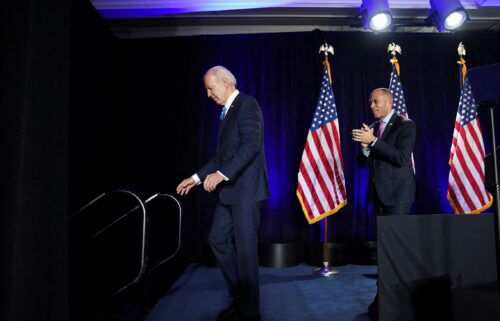White House informed Congress of unsuccessful Yemen mission in classified Soleimani notification

The Trump administration informed Congress that it had unsuccessfully targeted an Iranian military official in Yemen days after the attempt was carried out, apprising lawmakers of the operation in the same classified notification that was sent to Capitol Hill regarding the drone strike that killed Qasem Soleimani, according to several sources familiar.
News of the additional operation in Yemen, which occurred on the same day as the strike on Soleimani, first became public last week and has fueled questions about the administration’s legal authority to take military action against Iran without congressional approval.
The classified War Powers notification, which was sent to Congress earlier this month, cites Article II and the 2002 Authorization for Use of Military Force (AUMF) as legal justifications but does not make an explicit connection between each individual action and a specific authority, the sources said.
The law dictates that such a notice must be sent within 48 hours of US forces entering into hostilities in accordance with the War Powers Act — a series of procedural requirements to ensure that presidents keep Congress apprised of military decisions.
Democrats have questioned the administration’s motives for keeping the notification classified, particularly as they say officials have struggled to articulate why ordering the military action without informing Congress ahead of time was lawful.
House Speaker Nancy Pelosi said in a statement earlier this month that the White House’s notification “raises more questions than it answers,” slamming the decision to classify it as a “highly unusual” move that “compounds our many concerns, and suggests that the Congress and the American people are being left in the dark about our national security.”
Numerous lawmakers, though mostly Democrats, have condemned the administration for not consulting with Congress before the strike, saying officials have also failed to clearly explain the legal underpinnings to justify those actions since then.
“Since President Trump ordered the targeted killing of General Qassim Soleimani on January 3, the Administration has failed to answer key questions about the strike’s legal authority and the alleged imminent threat that made the strike necessary,” Rep. Adam Smith, the Democratic chairman of the House Armed Services, tweeted Tuesday.
Senators appear likely to rebuke Trump soon in the form of a Senate vote on a War Powers resolution to limit President Donald Trump’s military actions in Iran. CNN reported Tuesday that the Senate Foreign Relations Committee will hold a classified hearing on the administration’s Iran policy and legal authority on Wednesday.
Among those officials expected to brief lawmakers is the State Department’s Acting Legal Adviser Mark String, who told lawmakers in July that “the administration has not, to date, interpreted either the 2001 or 2002 AUMF as authorizing military force against Iran, except as may be necessary to defend US or partner forces as they pursue missions authorized under either AUMF.”
At the time, he also promised Senate lawmakers he would submit a public report if the administration changed its views on its legal or policy framework for the use of force against Iran, as first reported by Just Security.
And Sen. Tim Kaine, a Virginia Democrat, also announced Tuesday that his War Powers resolution to limit Trump’s military actions in Iran has enough supporters to reach the 51-vote threshold to pass in the Senate, after he made changes to the text to satisfy some uncertain Republicans.
“We now have a majority of colleagues Democratic and Republican who will stand strong for the principle that we shouldn’t be at war without a vote of Congress, and that’s a very positive thing,” Kaine said.
He said GOP Sens. Mike Lee, Rand Paul, Todd Young and Susan Collins support the resolution. Lee was especially outspoken against the administration’s actions after a briefing from top officials, which he said was the worst briefing he had attended since being elected to the Senate.
Kaine’s original war powers resolution was ready for a vote this week, and GOP leaders said it would come up as soon as Wednesday. But in his bid to win over Republicans, he had to file a new version of the War Powers resolution. The new resolution won’t be able to come up for a vote until next week, and the timing may be further complicated by the impending impeachment trial.
Kaine said he is hopeful bipartisan Senate leaders can either reach an agreement to vote during hours the trial is not in session or agree to vote on he new version this week. It’s unclear how that will play out.



